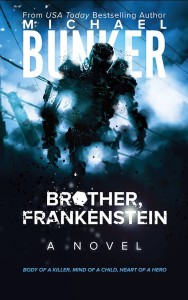What I’m Reading: BROTHER, FRANKENSTEIN by Michael Bunker
 I am about to be very cruel to all of you. I am going to tell you about a fabulous book I read that you can’t buy.
I am about to be very cruel to all of you. I am going to tell you about a fabulous book I read that you can’t buy.
Wait—it gets worse: I can’t even tell you when you can buy it.
The book, of course, is Brother, Frankenstein, the latest from USA Today best-selling author Michael Bunker, and I will endeavor to speak of this fantastic novel without spoilers.
Dr. Christopher Alexander is a surgeon leading a DARPA project to develop a Human Adapted Droid. A HADroid is exactly what you think it is, a human brain and cardiovascular system transplanted into a robot. The HADroid is designed to look like a perfectly normal person until danger comes along and then it…no spoilers, remember? Let’s just say Bunker does a magnificent job with the technical details of instantaneously transforming a mild-mannered Amish kid into the baddest of badasses.
The patient is Frank, an autistic eleven-year-old Amish boy with a chronic condition that deforms his tiny body and shortens his life. Dr. Alexander meets Frank as part of his pro bono work in a free clinic. (Lest you think Dr. Alexander is a good guy, he’s using it as a tax dodge and a way to scam medical data from the unsuspecting Amish.) You probably see where this is going: the “good” doctor uses the brain and heart of young Frank for his HADroid project. However, when DARPA decides at the last-minute that they want to kill the project—and Frank—Dr. A goes on the run with his young patient/killer robot.
I’ve talked about Michael Bunker and his worldview in previous posts and Brother, Frankenstein builds on that foundation. The Plain People and their philosophy play a major influence in the story. Dr. Alexander even suspects that Frank’s rapid, seamless integration into the HADroid body is a result of his Amish background. Later in the story, the Amish way of life is a source of solace for the doctor as well as for Frank.
Brother, Frankenstein revolves around society’s relationship with technology. Technology saves young Frank’s life, but it also puts him at odds with a super-villain government agent trying to destroy him with every imaginable piece of battle gear. Frank fights back with his militarily-enhanced HADroid body, “dishing out death like prison food to inmates.” (my favorite line in the book). For you Bunkerites, you’ll even get a hint at the beginnings of the Transport Authority.
At the center of this technological yin and yang is Dr. Alexander, the narrator, and for my money, Bunker’s finest fictional creation to date. Most of the novel is told in the first-person voice of this drunken, manipulative, ethically-challenged individual. Alexander is a man in tension. He admits his desire to “save” Frank is mostly selfish, but he also agonizes over what he’s done to his young friend when he says: “the whole world isn’t big enough to contain the fear that floods over me like a baptism.” These glimpses of humanity are what make the voice of Dr. Alexander sing.
Brother, Frankenstein is the story of how one man is redeemed by an autistic Amish boy trapped in the body of killer robot.
Highly recommended—when you can get it.
If you're now hankering for a Bunker fix of Amish sci-fi, I suggest you try his novel PENNSYLVANIA or some of the multiple PENN fan-fic pieces, including my own contribution, The Yesterday Adjustment.
 David Bruns is the creator of the sci-fi series The Dream Guild Chronicles, and one half of the Two Navy Guys and a Novel blog series about co-writing the military thriller, Weapons of Mass Deception, coming in May 2015.
David Bruns is the creator of the sci-fi series The Dream Guild Chronicles, and one half of the Two Navy Guys and a Novel blog series about co-writing the military thriller, Weapons of Mass Deception, coming in May 2015.
